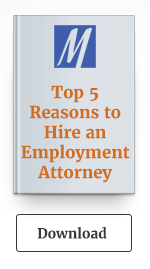
Non-compete agreements are becoming more and more common. Once limited to high-level employees in whom companies invested a great deal of time and trust, these restrictions are now frequently imposed without negotiation on lower-wage and lower-level employees. The laws regarding which non-compete agreements are enforceable vary from state to state, and pending legislation may soon dramatically alter how New Jersey determines which non-compete agreements are enforceable against its workers.
What Does a Non-Compete Agreement Do?
A non-compete agreement prohibits an employee from engaging in any business activities that compete with their employer's business. Some of these agreements operate in the present to prohibit the employee from taking a second job. Others only take effect when the employee leaves the company, restricting where and for whom the employee can seek future work. These agreements are designed to protect an employer’s interests, especially if the business has invested a lot of time or money to onboard or educate a worker or if that worker possesses confidential or sensitive information about the employer's customers, operations, trade secrets, business practices, designs, or marketing/product development plans. Imagine, for example, how a high-level developer who has spent a decade at one prominent software company leaving to take a job with its biggest competitor could give the competitor a significant advantage. In situations like this, an employer often compensates such a valuable worker for giving up the freedom to leave and work elsewhere.
What Should a Non-Compete Agreement NOT Do?
Even though state laws differ on what circumstances are necessary for a non-competition agreement to be enforceable, they share the premise that such agreements are not intended to hold a worker hostage or punish them for leaving a company by restricting their ability to continue to work in their profession. If a non-compete agreement seems to punitively restrict a worker’s right to seek employment rather than simply protect a company’s legitimate interests, a court may conclude it is unenforceable. Several courts have recently refused to enforce these agreements against low-wage workers, holding that they are against public policy. To make clearer which agreements are enforceable and which are not, many states have passed or are in the process of creating laws that establish clear guidelines for these agreements.
Changing New Jersey Law Regarding Enforceable Non-Compete Agreements
Such a bill is currently pending in the New Jersey legislature. Assembly Bill A1769 would require non-compete agreements comply with certain specific requirements to be enforceable against workers in the state. However, it is not yet law. The current New Jersey law requires courts to determine whether each non-compete agreement is enforceable on a case-by-case basis.
Generally, an agreement “will be given effect if it is reasonable under all the circumstances of [the] particular case,” and “simply protects the legitimate interests of the employer, imposes no undue hardship on the employee, and is not injurious to the public.”[1] These “legitimate interests” include customer relationships or goodwill, trade secrets, and confidential business information; simply preventing competition is not a sufficient interest.[2] A court balances the value of protecting these legitimate interests against the difficulty that the agreement imposes on the employee in finding other work in his or her field or other ways that it acts as a burden or restriction to the employee.[3]
Even if the protectable interests of an employer outweigh the burden of a non-compete agreement on an employee, New Jersey law allows the court to take the broader public interest into account. For example, one court found that the fact that a particular location was experiencing a shortage of qualified neurosurgeons was relevant to whether the terms of an agreement between a hospital and its former employee that prohibited the doctor from working in the area should be enforced.[4]
If a New Jersey court determines that an agreement is overbroad, it can “blue pencil” it to strike out parts as necessary until it narrowly accomplishes its objective of protecting a legitimate business interest without overburdening the employee’s rights or going against the public interest. The courts aim to “fulfill a restrictive covenant's lawful objectives while nevertheless ensuring that such agreements do not unreasonably hinder competition or employee mobility.”[5]
Seek Legal Advice for Questions About Enforceability
Unfortunately, this case-by-case approach means that there is no definite answer to whether a particular agreement is enforceable in New Jersey; each one’s validity depends on whether a court believes it to be reasonable. If you believe your non-competition agreement is unenforceable or unfair, consult with an attorney. It may be advisable for you to bring litigation against your employer to determine its enforceability.
The bill that is under review in the state legislature would create a basic framework of requirements for a non-compete agreement to be enforceable. Some of these rules would create specific requirements for the terms of the agreements (like limiting them in duration to one year after a worker’s employment ends). Others would address the process of how agreements may be legally entered into (for example, requiring that an employer provide notice of the agreement at the time a formal offer of employment is made or at least 30 days before the employee begins work). If this law is enacted, agreements that may have previously been enforceable in New Jersey could become unenforceable; it may also establish a way to avoid an unenforceable agreement without having to pursue litigation.
Currently, however, your best bet is to seek advice from an experienced lawyer if your current or potential employer has asked you to sign a non-compete agreement. An attorney can help you determine whether such an agreement is reasonable in your situation and, if appropriate, suggest limitations to protect your interests and negotiate compensation for any restrictions.
For additional information and updates regarding employment law, your rights, and how a lawyer may be able to help, subscribe to our blog.
[1] Solari Indus. v. Malady, 264 A.2d 53, 56 (N.J. 1970).
[2] Coskey's Television & Radio Sales & Serv., Inc. v. Foti, 602 A.2d 789, 794 (N.J. Super. Ct. App. Div. 1992).
[3] Community Hosp. Group v. More, 869 A.2d 884, 898 (N.J. 2005).
[4] Id. at 897–99
[5] ADP, LLC v. Rafferty, 923 F.3d 113 (3rd Cir. 2019).




.svg)